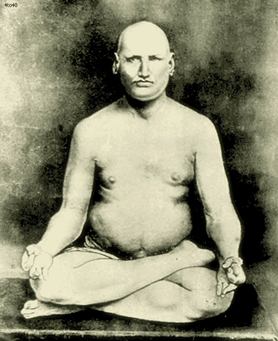Response to Women in Hinduism/Vedas Part II
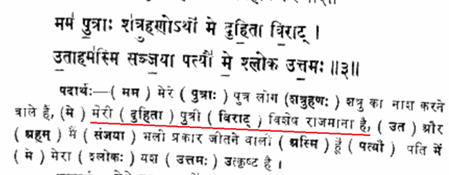
Make sure you read the first part of this article, Women in Hinduism/Vedas Part 1
CLAIM: VEDAS PRAY FOR BIRTH OF DAUGHTERS
It is true that the birth of the son was celebrated from last 100 years. But this was not because of a Vedic injunction. This is because of the Jihadis who were killing men and raping the women, so Sons were wished to defend from these Jihadis and to prevent rape. On contrary, there are specific verses in Vedas that pray for begetting daughters! Refer Rigveda 10.159.3, Rigveda 8.31.8, Yajurveda 22.22, Rigveda 4.32.23 and Atharvaveda 10.3.20.
RESPONSE:
The interesting thing to note is some Hindus always blame Muslims for the Vedic verses oppressing women and treating them like third class citizens. Woman in Vedas is merely seen as a commodity. There are verses that prays only for the birth of a Son and doesn’t wish for Daughter, in fact the Vedas even says that a girl should be born somewhere else and 10 Sons should be born in this womb (this is the context of the hymn), this is the reason why the writer is talking about the so called Vedic verses wishing for Daughters.
In reality there isn’t a single verse which says so, Vedas pray for the birth of a Son in many passages like the entire hymn of Atharva Veda 6.11. and 7.48 are dedicated for the birth of a son and several verses like Atharva Veda 14.1.22, 12.3.47, 2.36.3, 14.2.72, Rig Veda 3.31.1, 10.85.42-45 and so on pray for the birth of a Son only but I don’t find a single verse that wishes for daughter.
All the verses the writer has quoted are mistranslated although he claims to be using “Authentic” translation. I will mostly be using Arya Samaj translations and also orthodox Hindi translations of renowned Hindu scholars like Shri Ram Acharya, Swami Karpatri and Pundit Ram Govind Trivedi.
The first verse he quoted about Daughter’s birth is Rig Veda 10.159.3, first let’s see what he wrote in another article
CLAIM:
Chapter 1: Women in Vedic Dharma, Page 21
Rig 10.159
A women speaks after waking up in morning, “My destiny is as glorious as the rising sun. I am the flag of my home and society. I am also their head. I can give impressive discourses. My sons conquer enemies. My daughter illuminates the whole world. I myself am winner of enemies. My husband has infinite glory. I have made those sacrifices which make a king successful. I have also been successful. I have destroyed my enemies.”
(Book: Mera Dharma, Author: Priyavrat Vedavachaspati, Gurukul Kangri University)
MY RESPONSE:
He claimed that Rig Veda 10.159.3 prays for birth of a daughter but according to his own translation we can’t find any sentence where the birth of a daughter is wished. Here is the correct translation,
Rig Veda 10.159.3-6My Sons are slayers of the foe, my Daughter is a ruling Queen… and rid me of each rival wife. Destroyer of the rival wife, Sole Spouse, victorious, conqueror. The others’ glory have I seized as ’twere the wealth of weaker Dames.…I have subdued as conqueror these rivals, these my fellow-wives, That I may rule this Hero and the folk.

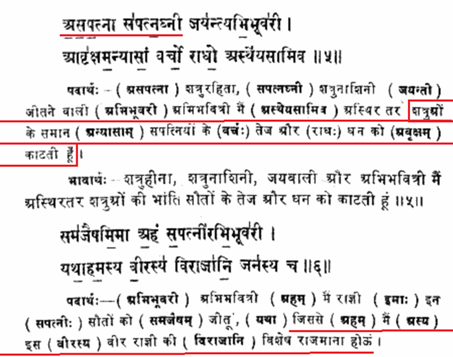
These verses doesn’t pray for the birth of a daughter rather this is a prayer of a greedy Queen who wants to get rid of her co-wives so that she may rule the kingdom. His last sentence is correct to an extent
The context of this verse is that a Queen has many co wives, and she is praying for the destruction of her co-wives so she may have control over all the wealth and rule the kingdom. It even states that she destroyed her rival wives. Can this verse which depicts a woman as greedy, wealth monger, killer of innocent rival wives be used to show that Women are praised in Vedas?
The correct translation for the next verse the writer has quoted is,
Yajurveda 22.22 “warrior ; the cow giving abundant milk, the ox good at carrying burden ; the swift courser ; the woman skilled in domestic affairs, May this sacrificer be blessed with sons”. Tr. Devi Chand. 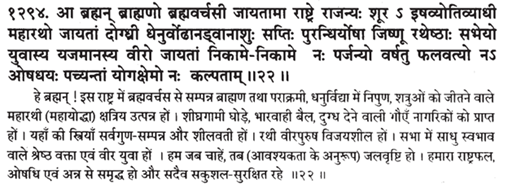
This verse also prays for the birth of a son only, and says that Women (Stri not daughter) should be skilled in domestic work, it doesn’t say that daughter should be born. This verse rather projects a woman as a slave who is used only for domestic work.
Rigveda 4.32.23 Like two slight images (puppets) of girls, unrobed, upon a new-wrought post, So shine the Bay Steeds in their course.

This verse is used by some Orthodox Hindus to prove Idol worship in Vedas. This verse doesn’t talk anything about begetting a daughter.
Atharva Veda 10.3.20 As glory dwelleth in a maid, and in this well-constructed car, So may the Charm, etc.

Rig Veda 8.31.8
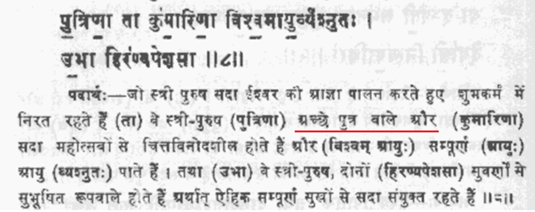
The above verse is translated as “The man and woman who obeys Ishwar and who does good deeds gets good Son…”
This verse do not speak of birth of a daughter, as we see here, other translations states that “They are blessed with sons”, the Arya Samaj Hindi translation also speaks of a Son born to parents who obeys Ishwar, So does that mean Ishwar will curse the people who do not follow him by giving them a Daughter? Griffith’s translation also doesn’t mention anything about begetting sons or daughters.
Rig Veda 9.67.10 May Pusan, drawn by goats, be our protector, and on all his paths Bestow on us our share of maids.

This verse does not pray for the birth of a daughter rather it is longing for WOMAN and praying to get women for carnal purpose. The Sanskrit word is Kanya which is translated as Maiden or Lady. Arya Samaj translations like Satyaprakash and Tulsi also does not mention anything about bestowing daughters.
CLAIM:
Rig Veda 5.47.6 mentions that: “Those educated women who happily choose their husbands and then give birth to noble children, plan and train their life and those of children in same manner as one weaves a cloth from threads slowly and steadily.”
MY RESPONSE:
Correct translation is
Rig Veda 5.47.6 “For him worshippers lengthen praises and works of adoration, and for him mothers (cosmos) sew garments of rays. Rejoicing in the contact of their impregnation, the rays, the consorts, of the sun, come to our presence by the path of the sky, to meet him.” Tr. Saty Prakash Saraswati
It does not talk about the “Educated Women”, rather this verse talks about a Woman weaving garment for her Son (according to Shri Ram Acharya translation).
CLAIM:
Yajurveda 5.10: O woman, realize your potential. You are a lioness who can destroy criminals, ignorance and vices and protect the noble ones.
MY RESPONSE:
Correct translation is.
Yajur Veda 5.10 “O speech, thou pronouncest words and overawest foes, attain to the learned. O speech, thou art the dispeller of ignorance, and remover of evils, purify the religious-minded people. O speech, thou art the destroyer of ignoble character and the subduer of mean demeanour, aborn thyself for the well-behaved learned persons.”- Tr. Devi Chand (Arya Samaj)
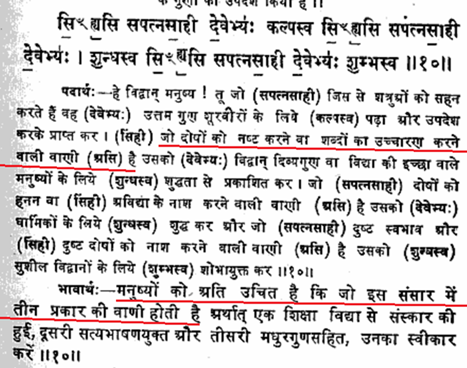
This verse is not even addressed to a woman, secondly it talks about the Vedic speech. The verse is in femininity because the addressee is Ved
Vani (Vedic Speech/words) which are feminine in Hindi and Sanskrit language.
TRANSLATION BLUNDER OF THE WRITER
CLAIM:
Atharva 14.1.20
Hey wife! Become the queen and manager of everyone in the family of your husband.
(Book: Mera Dharma, Author: Priyavrat Vedavachaspati, Gurukul Kangri University)
Similar meaning
(Atharvaveda-Hindi Bhashya Part 2, Author: Kshemkarandas Trivedi, Sarvadeshik Arya Pratinidhi Sabha, Delhi, Page 660)
He mentioned this same verse in the same article with different translations,
Atharva 14.1.20 Oh wife! Give us discourse of knowledge
(Book: Mera Dharma, Author: Priyavrat Vedavachaspati, Gurukul Kangri University)
Chapter 1: Women in Vedic Dharma, Page 9
The bride may please everyone at her husband’s home through her knowledge and noble qualities.
(Atharvaveda-Hindi Bhashya Part 2, Author: Kshemkarandas Trivedi, Sarvadeshik Arya Pratinidhi Sabha, Delhi, Page 660)
MY RESPONSE:
Atharva Veda 14.1.20 Let Bhaga take thy hand and hence conduct thee: let the two Asvins on their car transport thee. Go to the house to be the household’s mistress, and speak as lady to thy gathered people.
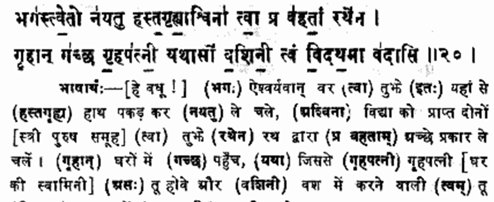
This verse does not ask the wife to give knowledge, nor it says to become the queen, this verse talks about a Bride and Bridegroom. The author should quote the 22nd verse which prays for Sons and Grandsons.
Atharva Veda 14.1.22… With sons and grandsons
sport and play, rejoicing in your happy home.

Read the article Obscenity in Vedas for English translation of Arya Samaj.
REPEATED TRANSLATION BLUNDER OF THE WRITER
Yajurveda 10.26: O woman, you provide bliss and stability to world. You are source of valour.
Before I continue, I want to quote the same verse that this same fanatic quotes in his other article,
Yajur Veda 10.26
In this mantra it is enforced that the wife of ruler should give education of politics to the others. Likewise the king do justice for the people, the queen should also justify her role.
(Book: Vagambhraniya, Author: Dr Priyamvada Vedbharti)
His translation differs on the same verse, so how can we the trust such person. The correct translation is,
Yajur Veda 10.26 Fair art thou, good to sit on, womb of kingship. Sit on the fair one, sit on that which offers a pleasant seat: sit in the womb of kingship.
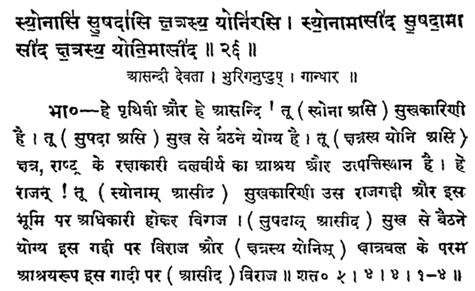
CLAIM:
Yajurveda 13.18: O woman, you are as strong as earth and are on very high pedestal. Protect the world from path of vices and violence.
RESPONSE:
Yajur Veda 13.18 Thou art the earth, the ground, thou art the all-sustaining Aditi, she who supporteth all the world. Control the earth, steady the earth, do thou the earth no injury.

This verse is addressed to Earth and Aditi (a goddess).
CLAIM:
Rigveda 4.14.3: O brilliant woman, remove ignorance with your bright intellect and provide bliss to all.
Atharva Veda 14.1.47: O woman, may you be strong and powerful like a rock. May you gain brilliance of sun and have a long prosperous life that benefits all.
RESPONSE:
Correct translation is
Atharva Veda 14.1.47 I place upon the lap of Earth the Goddess, a firm auspicious stone to bring thee children. Stand on it, thou, greeted with joy, resplendent: a long long life may Savitar vouchsafe thee.
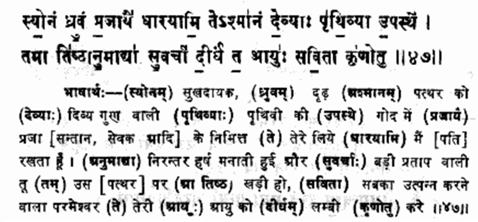
Rig Veda 4.14.3 Red Dawn [Usha] has come, riding with brightness onward, distinguished by her beams, gay-hued and mighty. Dawn [Usha] on her nobly-harnessed car, the Goddess, awaking men to happiness, approacheth.
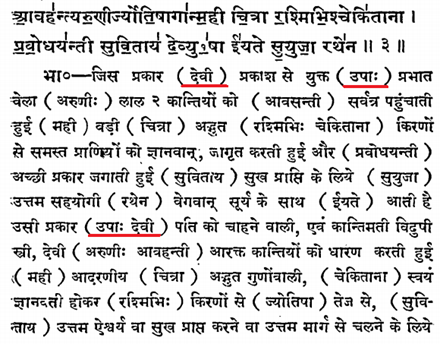
This deity in this verse is Usha the Goddess of Dawn and it is addressed to her not to a common woman.
CLAIM:
Yajurveda 20.84: May the scholarly woman purify our lives with her knowledge, noble actions and guidance.
MY RESPONSE:
Actually this verse is addressed to the Hindu goddess Saraswati, but Arya Samajis considers it to be Vedic speech, So here the verse is addressed to Vedic speech not to women as per the Arya Samaj translation,
Yajur Veda 20.84 May Vedic speech, our purifier, powerful through the force of diverse forms of knowledge, with wisdom and riches acquired through enterprise, beautify our Yajna”. Tr. Devi Chand
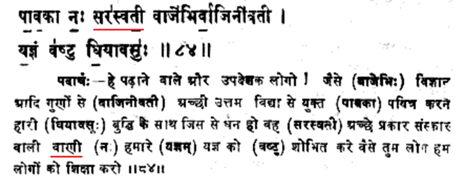
CLAIM:
Atharva 7.46.3 Teach the husband ways of earning wealth
(Book: Mera Dharma, Author: Priyavrat Vedavachaspati, Gurukul Kangri University)
Chapter 1: Women in Vedic Dharma, Page 9
Protector of children, having definite knowledge, worth thousands of prayers and impressing all directions, O women, you accept prosperity. O wife of desrving husband, teach your husband to enhance wealth.
(Atharvaveda-Hindi Bhashya Part 1, Author: Kshemkarandas Trivedi, Sarvadeshik Arya Pratinidhi Sabha, Delhi, Page 804)
MY RESPONSE:
Here is the Hindi translation of the verse by a Arya Samaji scholar,

According to Tulsi Ram’s and Griffith’s translation this verse is addressed to Sinivali (A Goddess), read the first verse of this hymn which is addressed to the Goddess moreover the husband here is the Hindu god Vishnu. This is also a payer made to Goddess requesting her husband to bestow riches. Your doubts will be cleared if you read all 3 verses of this hymn,
Atharva Veda 7.46.1-3 O broad-tressed Sinivāli, thou who art the sister of the Gods, Accept the offered sacrifice, and, Goddess, grant us progeny. Present the sacrifice to her, to Sinivāli, Queen of men, Beautiful-fingered, lovely-armed, prolific, bearing many a child. Thou who as Queen of men art Indra’s equal, a Goddess coming with a thousand tresses, To thee our sacrifices are performed, O Consort of Vishnu Goddess, urge thy Lord to bounty!
The Commentary and Hindi translation of Kshemkarandas Trivedi is also distorted, His translation is same as I quoted above and below is his commentary,

“Women being clever in domestic work, saving the money earned by their husbands should nurture the children.”-Commentary by Kshemkaran Das Trivedi, Atharva Veda Hindi Bhasya, page 804.
CLAIM:
Atharva 11.5.18 In this mantra of Brahmcharya Sukta, it is emphasized that girls too should train themselves as students and only then enter into married life. The Sukta specifically emphasizes that girls should receive the same level of training as boys.
(Book: Mera Dharma, Author: Priyavrat Vedavachaspati, Gurukul Kangri University)
Chapter 1: Women in Vedic Dharma, Page 8
Girls should train themselves to become complete scholars and youthful through Brahmcharya and then enter married life.
(Atharvaveda-Hindi Bhashya, Part 2, Author: Kshemkarandas Trivedi, Sarvadeshik Arya Pratinidhi Sabha, Delhi, Page 413-414)
(Book: Mera Dharma, Author: Priyavrat Vedavachaspati, Gurukul Kangri University)
MY RESPONSE:
Atharva Veda 11.5.18 “A maiden living in chastity by controlling her senses wins for her husbandship a young bachelor of similar qualifications. Even bulls, horses and beasts nourish themselves with fodder and keep their sexual appetit in control.” Tr. Vaidyanath Shastri
This verse does not state that girls should educate themselves. The word Brahmacharya here denotes self-restraint, not about getting education, if it is about getting education then can the writer please explain which school educates Bull and Horse? This is why Griffith whose translation is based on Hindu scholars also translates it as “by Self-restraint”.
Atharva Veda 11.5.18 “By self-restraint a maiden finds a youth to be her wedded lord. By self-restraint the ox and horse seek to win fodder for themselves.” Tr. Ralph T.H. Griffith
It is mentioned in Garuda Purana,
Garuda Purana 1.49.31 “…Brahmacarya is refraining from sexual intercourse…” Tr. J.L. Shastri
CLAIM:
Atharva 7.47.1 Oh woman! You are the keeper of knowledge of all types of actions (karma).
(Book: Mera Dharma, Author: Priyavrat Vedavachaspati, Gurukul Kangri University)
Chapter 1: Women in Vedic Dharma, Page 9
O woman, you provide us wealth and prosperity.
(Atharvaveda-Hindi Bhashya Part 1, Author: Kshemkarandas Trivedi, Sarvadeshik Arya Pratinidhi Sabha, Delhi, Page 804)
Similar meaning:
(Book: Atharvaved ka subodh bhashya (7-10 chapters), Author: Sripad Damodar Satvalekar, Page 98)
Atharva 7.47.2 Oh woman! You know everything. Please provide us strength of prosperity and wealth
(Book: Mera Dharma, Author: Priyavrat Vedavachaspati, Gurukul Kangri University)
Chapter 1: Women in Vedic Dharma, Page 9
O woman! You enhance our wealth and prosperity
(Atharvaveda-Hindi Bhashya Part 1, Author: Kshemkarandas Trivedi, Sarvadeshik Arya Pratinidhi Sabha, Delhi, Page 805)
Similar meaning:
(Book: Atharvaved ka subodh bhashya (7-10 chapters), Author: Sripad Damodar Satvalekar, Page 98)
He also quotes
Atharva 7.48.2 Oh woman! Please provide us with wealth through your intellect
(Book: Mera Dharma, Author: Priyavrat Vedavachaspati, Gurukul Kangri University)
Chapter 1: Women in Vedic Dharma, Page 9
Scholarly, respectful, thoughtful, happy wife protects and enhances wealth and bring happiness in home.
(Atharvaveda-Hindi Bhashya Part 1, Author: Kshemkarandas Trivedi, Sarvadeshik Arya Pratinidhi Sabha, Delhi, Page 806)
RESPONSE
Atharva Veda 7.47.1 Oft in this sacrifice with favoured cry I call Kuhu, beneficent Goddess, skilled in all her works. May she vouchsafe us wealth with every boon, and give a, hero meet for praise who gives a hundred gifts.
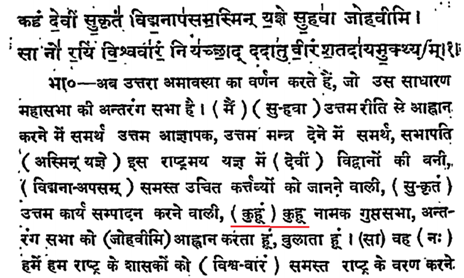
Atharva Ved 7.47.2 Oft in this sacrifice with favoured cry I call Kuhu, beneficent Goddess, skilled in all her works. May she vouchsafe us wealth with every boon, and give a hero [Son]meet for praise who gives a hundred gifts.
(Hindi Shri Ram Acharya translation)

Atharva Veda 7.48.2 All thy kind favours, Raka! lovely in their form, wherewith thou grantest treasures to the man who gives, With these come thou to us this day benevolent, O blessed one, bestowing wealth of thousand sorts.
(Hindi Shri Ram Acharya translation)

The writer has translated the names of goddesses Raka and Kuhu as woman, but actually these are the names of the Hindu goddesses,
Bhagawad Purana 4.1.34: Angira’s wife, Sraddha, gave birth to four daughters, named Sinivali, Kuhu, Raka and Anumati.
Nirukta 11.28 “Anumati and Raka are two wives of gods”
Nirukta 11.33 “Simvali and Kuhu are two wives of gods”
Offerings were made to these goddesses
Krishna Yajur Veda 5.6.18 “To Aditi are (to be offered) three ruddy-spotted; to Indrani three black-spotted; to Kuhu three red-spotted; three calves to Raka; three heifers to Sinivali; the red-spotted hornless ones are for Agni and Visnu.”
So it’s clear that these verses refer to Hindu goddesses not to common women. Kuhu is the goddess of the new moon day. The Atharva Veda 7.47 is a hymn for gaining wealth and Son. The verses addressed to Goddesses can not be used to portray women are highly revered in Vedas, readers can go through this article to know why Goddesses are praised Why did the Brahmins dethrone the Gods and enthrone the Goddesses?
for the sake of the argument even if I accept his translation to be correct, it doesn’t necessarily mean that the wife is a good luck charm that will bring wealth. A woman in Hinduism brings wealth with her as a Dowry, even after the marriage she has to keep bringing money from her parent’s house, so this is how she brings wealth, Dayanand Saraswati writes,
‘‘If the bride’s people do not live very far from her husband’s home, there is a possibility of her parents becoming poor, as whenever she visits her parents, they will have to give her something or other by the way of a present.”-Satyarth Prakash ch 4, p84.
Further the Hymn of Atharva Veda 7.48 is also a prayer to get wealth and a SON. The author should have honestly quoted the previous verse also,
Atharva Veda 7.48.1 …may beget sons…

Vedas doesn’t say woman brings prosperity, but prosperity here only means the birth of a son, Rig Veda and the hymn of Atharva Veda 7.48 is entirely dedicated for birth of a son and prosperity. Another verse states that
Rig Veda 10.63.15 Vouchsafe us blessing in our paths and desert tracts, blessing in waters and in battle, for the light; Blessing upon the wombs that bring male children forth
Atharva Veda 12.3.47 …A youthful world, a son hath been begotten. Begin a life that brings success and triumph.
Similarly the woman who has no son was looked down in the Vedic period, it is mentioned in the Brahmana,
Satapatha Brahmana 5.3.1.13 And on the following day he goes to the house of a discarded (wife), and prepares a pap for Nirriti;–a discarded wife is one who has no son…hail!’ For a wife that is without a son, is possessed with Nirriti (destruction, calamity)…
So in the Vedic scripture the woman brings prosperity only by giving birth to a son, if she doesn’t she is discarded, looked down, rejected, cursed.
CLAIM:
Atharva 14.1.64 Oh woman! Utilize your vedic intellect in all directions of our home!
(Book: Mera Dharma, Author: Priyavrat Vedavachaspati, Gurukul Kangri University)
Chapter 1: Women in Vedic Dharma, Page 9
O bride! Reach the home of scholars and bring bliss and happiness by ruling your home
(Atharvaveda-Hindi Bhashya Part 2, Author: Kshemkarandas Trivedi, Sarvadeshik Arya Pratinidhi Sabha, Delhi, Page 678)
Chapter 1: Women in Vedic Dharma, Page 8,9
When girls ignore external objects and develops foresight and vibrant attitude through power of knowledge, she becomes provider of wealths of skies and earth. Then she should marry an eligible husband.
(Atharvaveda-Hindi Bhashya, Part 2, Author: Kshemkarandas Trivedi, Sarvadeshik Arya Pratinidhi Sabha, Delhi, Page 654)
MY RESPONSE:
This verse is recited before the bride enters her in law’s house, it does not say anything like the bride should utilize her Vedic intellect it says that Vedas should be chanted (by the priest).
Atharva Veda 14.1.64 “Let Brahma, the Vedic prayer with Vedic verses be offered before, and after, let the Vedic verses be chanted in the middle and let the Ved mantras be pronounced all around. O bride! reaching the portal of magnificient home, without under-going any trouble and shine being gentle and auspicious in the house of your husband.” Tr. Vaidyanath Shastri
CLAIM:
Atharva 1.14.3 Oh groom! This bride will protect your entire family
(Book: Mera Dharma, Author: Priyavrat Vedavachaspati, Gurukul Kangri University)
Chapter 1: Women in Vedic Dharma, Page 13
O groom! This bride is protector of your entire family. May she dwell in your home for a period and sow seeds of intellect.
(Atharvaveda-Hindi Bhashya Part 1, Author: Kshemkarandas Trivedi, Sarvadeshik Arya Pratinidhi Sabha, Delhi, Page 80-81)
MY RESPONSE:
Atharva Veda 1.14.3. This woman shall be the keeper of thy house, O king (Yama), and her do we make over to thee! May she long sit with her relatives, until (her hair) drops from her head!
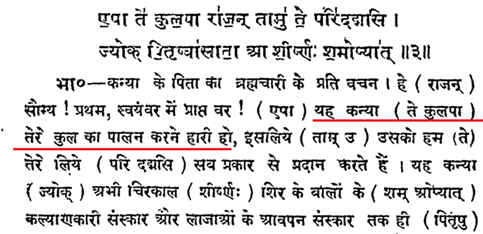
The speaker in this verse is not God, it’s the father. The Arya Samaj translation does not say that the “Woman/Bride shall be the protector of your family”. This verse is spoken by the father to his daughter’s in laws. Usually parents only speak the goodness of their children.
CLAIM:
Atharva 2.36.3 May this bride become the queen of the house of her husband and enlighten all.
(Book: Mera Dharma, Author: Priyavrat Vedavachaspati, Gurukul Kangri University)
RESPONSE:
Atharva Veda 2.36.3 This woman shall obtain a husband, since king Soma makes her lovely! May she, begetting sons, become a queen; may she, going to her husband, shine in loveliness!
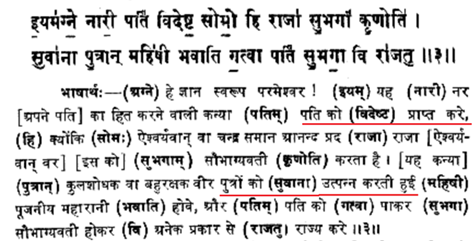
The writer is quoting half-baked verses, he correctly quoted that the Bride may become the queen of her husband’s house but didn’t say how she could become queen. It’s simple, by Begetting a Son. If begetting a son makes a woman the queen of the house then begetting a daughter might make her the housemaid. It also does not state that she should enlighten all but it says she shines in lovliness.
CLAIM:
Atharva 14.1.61
Hey bride! You shall bring bliss to all and direct our homes towards our purpose of living
(Book: Mera Dharma, Author: Priyavrat Vedavachaspati, Gurukul Kangri University)
Chapter 1: Women in Vedic Dharma, Page 14
Similar meaning
(Atharvaveda-Hindi Bhashya Part 2, Author: Kshemkarandas Trivedi, Sarvadeshik Arya Pratinidhi Sabha, Delhi, Page 677)
RESPONSE:
Atharva Veda 14.1.61 “O bride! you mount on this chariot which is decorated with good flowers, which have various colours, which is goldenhued which is strongly bound, good wheeled and which moves comfortably. Mount the Loka, the house-hold life which is the source of immorality and make the marriage auspicious for your husband and other members of the family.” Tr. Vaidyanath Shastri

Above is Damodar’s (Arya Samaj) Hindi translation. It only asks the bride to make the marriage auspicious.
CLAIM:
Atharva 14.2.74
This bride is illuminating. She has conquered everyone’s hearts!
(Book: Mera Dharma, Author: Priyavrat Vedavachaspati, Gurukul Kangri University)
Chapter 1: Women in Vedic Dharma, Page 14
May the bride be victorious and prosperous!
Similar meaning
(Atharvaveda-Hindi Bhashya Part 2, Author: Kshemkarandas Trivedi, Sarvadeshik Arya Pratinidhi Sabha, Delhi, Page 709)
Atharva 14.2.71
Hey wife! I am knowledgeable and you are also knowledgeable. If I am Samved then you are Rigved.
(Book: Mera Dharma, Author: Priyavrat Vedavachaspati, Gurukul Kangri University)
Chapter 1: Women in Vedic Dharma, Page 14
Similar meaning
(Atharvaveda-Hindi Bhashya Part 2, Author: Kshemkarandas Trivedi, Sarvadeshik Arya Pratinidhi Sabha, Delhi, Page 708)
RESPONSE:
These verses are to be recited during the marriage ceremony, This verse does not say that the Bride has conquered everyone’s heart, or the bride be prosperous.
Atharva Veda 14.2.74 Her who first guided by a rein came hither, giving the bride, here offspring and possessions, Let them convey along the future’s pathway. Splendid, with noble children, she hath conquered.
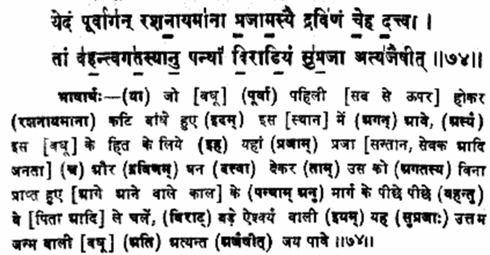
Atharva Veda 14.2.71-72 I am this man, that dame art thou I am the Samved and thou the Rigved. I am the heaven and thou the earth. So will we dwell together here, parents of children yet to be. Unmarried men desire to wed; bountiful givers wish for sons. Together may we dwell with strength unscathed for high prosperity.

First of all the speaker here is a man wishing for a Bride, secondly the Arya Samaj translation does not state that “I’ am knowledgeable so are you”. Next verse of this hymn prays for begetting a Son, So again there is a discrimination against birth of Daughter. The Upanishad explains this verse,
Brihadaranyaka Upanishad 6.4.20 “Then he embraces her, repeating the following mantra:I am the vital breath and you are speech. You are speech and I am the vital breath. I am Saman and you are Rig; I am heaven and you are earth. Come, let us strive together so that we may have a male child.”
The next verses of this Brihadaranyaka Upanishad are too vulgar, it explicitly tells sex positions. So I won’t be quoting it here, readers can check those verses in the article Hinduism and Lust. The writer is quoting verses which are to be recited at the time of marriage or when the Bride enters the house, she brings lot of wealth with her as dowry and is wished only for begetting sons so how can these verses be used to show women are revered in Vedas? Even a horse or bull which is slaughtered in the Yajna is mentioned in similar way in the Vedas. If the writer wants to show equal status of women in Vedas then he should quote verses giving them equal inheritance, praising common women (Not goddesses), permitting them to get education, allowing them to do trade and commerce etc.
CLAIM:
Atharva 7.38.4 and 12.3.52
Women should take part in the legislative chambers and put their views on forefront.
(Book: Mera Dharma, Author: Priyavrat Vedavachaspati, Gurukul Kangri University)
Chapter 1: Women in Vedic Dharma, Page 23
RESPONSE:
The verse does not state that women can take part in the legislative chamber, this hymn is a Charm to Secure love, the speaker here is a woman who is praying to get back her Husband.
Atharva Veda 7.38.1-2 I dig this Healing Herb that makes my lover look on me and weep; That bids the parting friend return and kindly greets him as he comes. This Herb wherewith the Asuri drew Indra downward from the Gods, With this same Herb I draw thee close that I may be most dear to thee.

Atharva Veda 7.38.4-5 “Not only I desire in this august assembly O husband! but thou also admitted so. Thou then, be exclusively mine and should not and would not talk of other women. If you, O husband or wife! are far away from the men of family, if you are far away beyond the river, this herb may seem to bind you fast and bring you back to me.” Tr. Vaidyanath Shastri
According to Sayana this hymn is a Vashikaran (Black magic) Hymn. According to the Atharva 12.3.52 which the author has quoted says that both the Man and the Woman had spoken falsehood in the assembly,
Atharva Veda 12.3.52 “O ye men and women! whatever lie you tell in plays, whatever in meeting, and whatever untruth you speak in desiring wealth let all this dirt be left out in the lie or untruth itself. You always dress your self with common dress.” Tr. Vaidyanath Shastri
CLAIM:
Rig 10.85.7
Parents should gift their daughter intellectuality and power of knowledge when she leaves for husband’s home. They should give her a dowry of knowledge.
(Book: Mera Dharma, Author: Priyavrat Vedavachaspati, Gurukul Kangri University)
Atharva 14.1.6 Parents should gift their daughter intellectuality and power of knowledge when she leaves for husband’s home. They should give her a dowry of knowledge.
(Book: Mera Dharma, Author: Priyavrat Vedavachaspati, Gurukul Kangri University)
MY RESPONSE:
These verses are not about the dowry of knowledge but the actual dowry which the bride brings to her in laws. The evil roots of Dowry system in India originated from Vedas. There is a detailed article on Dowry in Hinduism written by Mushafiq Sultan The Menace of Dowry and its Origin
CLAIM:
Chapter 1: Women in Vedic Dharma, Page 9
Rig 3.31.1
The right is equal in the fathers property for both son and daughter
(Book: Mera Dharma, Author: Priyavrat Vedavachaspati, Gurukul Kangri University)
MY RESPONSE:
Rig Veda 3.31.1 WISE, teaching, following the thought of Order, the sonless gained a grandson from his daughter. Fain, as a sire, to see his child prolific, he sped to meet her with an eager spirit.
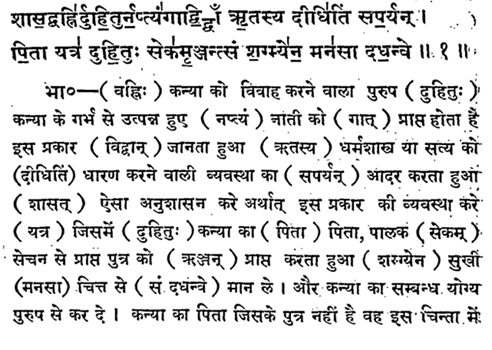
Rig Veda 3.31.1 “The disciplined and wise father, relying on the sanction of natural rights, honours his grandson, the son of his daughter, with valuable gifts. The father trusting to the impregnation of the daughter consoles himself with cheerful mind.” Tr. Satya Prakash Saraswati
This verse shows the eagerness to get a son, this verse is about a man who was sonless and gained a grandson from her daughter. Further this verse no where talks about equal share of property, Pandit jaydev writes in the commentary
“The grandson shall be the legal heir of his grandfather’s property”
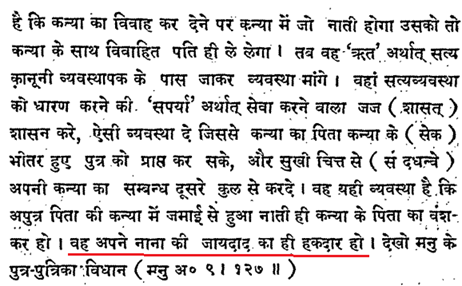
So where is the equal inheritance here? It is more biased, Several question arises from this commentary, Why does a grandson become the heir when the sonless man already has a daughter? Isn’t there equal inheritance for woman? Why does the Man need to adopt his grandson when he already has a daughter? Swami Dayanand Saraswati says that a sonless Man can contract Niyoga to get sons even if he has a Daughter. Why this partiality against daughters?
And how can Arya Samajis claim that Vedas give inheritance right to women when none of their scripture says? Vedas does not entitle woman to inherit, only the sons enjoys the right of inheritance. The Hindu law is that the women shall not inherit her father’s property and if the Father is sonless only then his grandson (from his daughter) should inherit his property, as it is recorded in Bhagwad Puran
Bhagwad Puran 10.57.37 “Since Satrajit had no sons, his daughter’s sons should receive his inheritance. They should pay for memorial offerings of waler and pinda, clear their grandfather’s outstanding debts and keep the remainder of the inheritance for themselves.
So if one has a son, then there is no chance for the daughter’s son to inherit his Grandfather’s property. For more details read my article No Inheritance for Women in Vedas
CLAIM:
Rig ved 1.164.41
One ved, two ved, or four ved along with ayurved, dhanurved, gandharved, aarthved etc in addition with education, kalp, grammar, nirukt, astrology, meters i.e the six vedaang should be attained by the clear-minded woman, which is equivalent to the crystal-clear water and spread this diversified knowledge among the people.
(Book: Vagambhraniya, Author: Dr Priyamvada Vedbharti)
O men and women! A scholarly woman who has practiced or teaches one, two or four Vedas or four Vedas and four upavedas, along with grammar, etymology etc and spreads knowledge to whole world and removes ignorance of people is source of happiness for entire world. A woman who studies and teaches all parts of Vedas brings progress to all human beings
(Book: Rigveda Bhashyam, Part III, Author: Dayanand Saraswati,Vedic Yantralaya, Page 382,383)
MY RESPONSE:
Rig Veda 1.164.41 The Speech has been uttered, fabricating the waters, and being one-footed, two footed, four-footed, eight-footed, nine-footed, or infinite in the highest heaven.
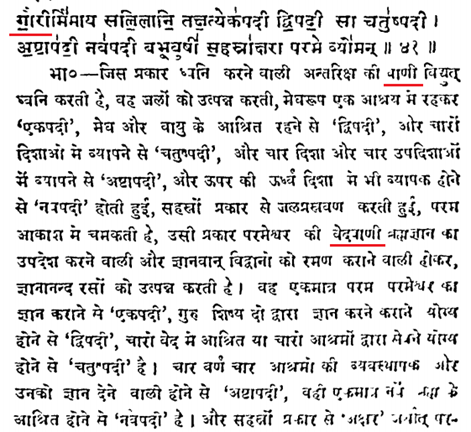
According to the Arya Samaj Jaydev’s and Shri Ram Acharya’s Hindi translations this verse is addressed to Vedic Speech.
CLAIM:
Rig ved 10.85.46
Like wise in so many other mantras a woman has been presented to play an essential role in family and as wife. Similarly she has been given the lead stage in society works, in governmental organizations, and for ruling the nation is also mentioned in Vedas.
(Book: Vagambhraniya, Author: Dr Priyamvada Vedbharti)
Rigevda contains several Suktas containing description of Usha as a God. This Usha is representation of an ideal woman. Please refer “Usha Devata” by Pt Sri Pad Damodar Satvalekar as part of “Simple Translation of Rigveda (Rigved ka subodh bhashya)”. Page 121 to 147 for summary of all such verses spread across entire Rigveda. In summary:
Women should be brave (Page 122, 128)
Women should be expert (Page 122)
Women should earn fame (Page 123)
Women should ride on chariots (Page 123)
Women should be scholars (Page 123)
Women should be prosperous and wealth (Page 125)
Women should be intelligent and knowledgeable (Page 126)
Women should be protector of family and society and get in army(Page 134, 136)
Women should be illuminating (Page 137)
Women should be provider of wealth, food and prosperity (Page 141- 146)
MY RESPONSE:
This is what the writer is trying to do in the whole article, when he can’t find any verse which praises women, he just twisted the verses attributed to Hindu Goddesses and said it speaks about common Women. All those verses are prayers to Vedic Godesses, they doesn’t praise common women. This translation is not fully correct. Usha was physically assaulted in Veda, I’ am using Shri Ram Acharya’s Hindi translation for this verse below,
Rig Veda 4.30.8-11 And this heroic deed of might thou, Indra, also hast achieved, That thou didst smite to death the Dame, Heaven’s Daughter, meditating ill. Thou, Indra, Mighty One, didst crush Usas, though Daughter of the Sky. When lifting up herself in pride.

According to some scholars Indra raped Usha, while according to others this is an allegorical verse and has a different meaning. However I’ am not talking about the context of this verse, the purpose is only to show that Usha does not represent the “Ideal Woman” in Vedas as the author claims. Usha is a goddess representing the sky and is considered the daughter of the sky. So my question to the author is If Usha represents the Ideal Woman then why did Indra (sometime translated as Ideal Man by Arya Samaj) assault Usha? Who is the ideal person here? Moreover this verse also gives a wrong impression of physical abuse on women.
As far as the verse Rigved 12.85.46 is concerned, the term Usha is not mentioned there, it’s referring to bride. He did not show the reason as to why the woman is getting special treatment, whole context can be understood by reading previous verses,
Rig Veda 10.85.42-45 … With sons and grandsons sport and play, rejoicing in your own abode. …Not inauspicious enter thou thy husband’s house … Loving the Gods, delightful, bearing sons [Hero]… O Bounteous Indra, make this bride blest in her sons and fortunate. Vouchsafe to her ten sons, and make her husband the eleventh man.
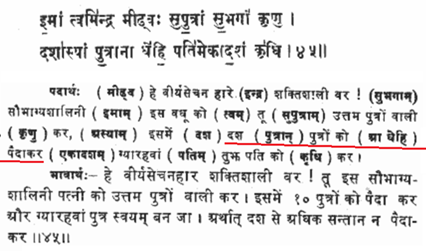
This verse prays for begetting 10 sons but doesn’t state anything about birth of even one daughter. This verse is about the bride and is recited before the bride enters the house. And the evils of this hymn is that this hymn of Rig Veda Mandal 10 Sukt 85 is about Dowry, where the bride brings wealth with her. Status of Women in Hinduism is no better than a prisoner, Read the articles to know about the position of Women in Vedas/Hinduism
Also read Response to Women in Hinduism/Vedas Part 1
Female Foeticide- The Bitter Truth


